From the reports coming out of Qatar through Arab media, it’s possible to assess what’s happening behind closed doors in Doha. What’s noteworthy is that parallel to the talks in Doha, an Arab summit on Syria’s future is taking place in Riyadh, and the participants in Riyadh are closely following the developments in Doha, with both events influencing each other. If an agreement on Gaza is reached, the entire Middle East will enter a new era, which will also draw in Syria—positively so, as strengthening Sunni Arab states in Gaza will strengthen them in Syria as well, and will check Turkey’s influence. The Riyadh talks include a Turkish representative, and Turkey’s future in Syria vis-à-vis Arab influence is undoubtedly being discussed there, with a Gaza agreement potentially giving momentum to Arab states in Syria as well.
What can already be said is that the agreement with Hamas will be implemented in phases, though the parties are struggling to establish a tight timeline for the three phases. The nature of the first phase is more or less known—it will be humanitarian both in terms of the type of released individuals, both Israeli and Palestinian, and in terms of increased humanitarian aid to Gaza.
Prime Minister Benjamin Netanyahu favors the phased approach because the final destination is already agreed upon—the end of the war. This is what Trump wants. On this matter, he’s aligned with Egypt, which also wants the phased approach, but for different reasons, in contrast to Qatar which wants a single comprehensive agreement.
Bibi wants the phased approach because it’s in his nature. What can be postponed is postponed, but mainly he wants to buy time to convince Smotrich and Ben Gvir not to leave his government. As long as the war hasn’t ended, they can justify their staying in the government, and until we reach the moment of truth when the dream of renewing settlements in Gaza dissipates, there’s still time for maneuvering.
Qatar wants tight phasing, in one sweep, to ensure Israel won’t harm the Hamas leadership remaining in Gaza. The war’s end is supposed to include guarantees for the safety of surviving Hamas leaders, and the sooner the better.
Egypt favors phasing because it has thus far failed to convince Abu Mazen to agree to a joint formula with Hamas on managing the Palestinian side of the Rafah crossing. It actually has an interest now in postponing the renewal of Rafah crossing operations to the third phase, hoping that by then a saving formula will be found. Egypt understands that a team agreed upon only by Hamas is problematic—to say the least.
Therefore, what Egypt and Qatar have agreed upon is phasing, but with all phases tightly linked to each other, a sort of compromise between the two approaches. The problem is that this agreement between the mediators faces reality on the ground, as Hamas-Qatar doesn’t control what happens in Gaza, and Hamas leadership in Qatar is unable to provide an authoritative list of living hostages and those who didn’t survive, and in its predicament published the list it received from Israel…
For lack of choice, and to meet Trump’s deadline, it seems we’ll again witness a first-phase deal, with subsequent phases not tightly linked to it.
When we reach the war-ending phase, Netanyahu will face the crisis of his absolute victory crumbling, and then they’ll need to search for wording about the war’s end that doesn’t mention the war’s end…
The uncertainty regarding the hostages to be released affects the number and nature of prisoners Israel will release. It’s clear that in the first, humanitarian phase, elderly and ill prisoners with no security or political significance will be released. However, if it turns out that fortunately there is a high number of living hostages, Israel will need to release heavy terrorist prisoners like the two Barghoutis—Marwan Barghouti, who has an aura of national leadership, and Abdullah Barghouti, a serious terrorist whose release is truly a difficult decision.
In general, the entire large Barghouti clan has shifted to Hamas’s side and pro-Iranian terror organizations, due to the harsh treatment by the PLO leadership in Tunis toward local leadership, and especially because it didn’t lift a finger to release the Barghouti sons from Israeli prison, in contrast to Hamas’s efforts to release its prisoners in various deals with Israel.
This matter of releasing heavy terrorists is the main issue troubling the settler leadership, and this might be the last straw for Smotrich. Struk indeed justified her opposition to the deal precisely on this issue—”the price” Israel will be required to pay.
It can be assumed that in Netanyahu’s talks with Smotrich, this issue is also addressed, and one can guess that he promises him that the heavy terrorists will be deported to Turkey and won’t endanger the settlements.
One hopes this won’t happen, as it’s preferable to have these dangerous terrorists under our watch rather than with Erdogan who would inflate them to monstrous proportions.
But this sectarian government is prone to making anti-state decisions, as that’s its nature.









